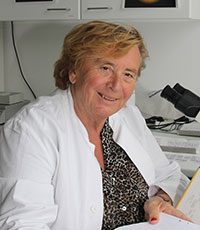 Dr
Vera Stejskal PhD
Dr
Vera Stejskal PhD
Associate Professor of Immunology, University
of Stockholm, Sweden
Prof. Vera Stejskal received her doctoral degree from Charles University in Prague, Czech Republic. For
18 years she worked as a Senior Research Adviser and Head of Immunotoxicology at Astra, Sweden, now
AstraZeneca. She is Associated Professor of Immunology at the University of Stockholm. Prof. Stejskal
has been and adviser to the World Health Organization, and served as an expert witness to a US
Congressional Committee on the issue of vaccine safety and thimerosal allergy. Inventor of the MELISA®
test, Prof. Stejskal is the author of more than 100 scientific publications in the field of allergy and
immunotoxicology. She is board member of European Academy of Environmental Medicine and
scientific member of I-GAP and Czech Society for Anti-Aging Medicine (A2M).
2015 - Metal allergy - the missing link in autoimmune connective tissue disorders?
Various factors such as vaccines, cosmetics, silicon and cigarettes have been
suggested to play a role in the etiology of autoimmune connective tissue
disorders (CTDs). Animal studies show that heavy metals such as mercury and
gold induce autoimmunity in genetically susceptible animals. Nickel has been
shown to induce Scleroderma (SLE) in rats. Molybdenum has been shown to
trigger SLE in humans and health improvement has been reported in patients
with various autoimmune CTDs following removal of mercury-containing dental
amalgam in mercury-allergic subjects.
We studied metal allergy in 41 patients, suffering from one or several
autoimmune CTDs (SLE, rheumatoid arthritis and Sjögrens). The majority of
patients exhibited clinical metal allergy (contact dermatitis from cheap
jewellery) and had many dental restorations. All patients had amalgam fillings
and dental gold in crowns and bridges. Some also had titanium implants. The
MELISA® test, an in vitro test for the detection of T-cells sensitized to metals, was
used to determine metal sensitivity. The results showed that metal allergy was
common in patients with autoimmune CTDs, the most frequent allergens being
nickel, mercury, gold and palladium. Through cytokines, metal-induced
inflammation causes unspecific symptoms (CFS, fibromyalgia) present in all
autoimmune diseases. The replacement of dental metals in sensitized patients
could make conventional therapy more efficient and thus contribute to health
improvement of patients with autoimmune CTDs. In one case, rheumatoid
arthritis was triggered by the implantation of chest wires containing nickel,
molybdenum and chromium in a metal sensitised patient. The patient became
symptom free after removal of the wires.